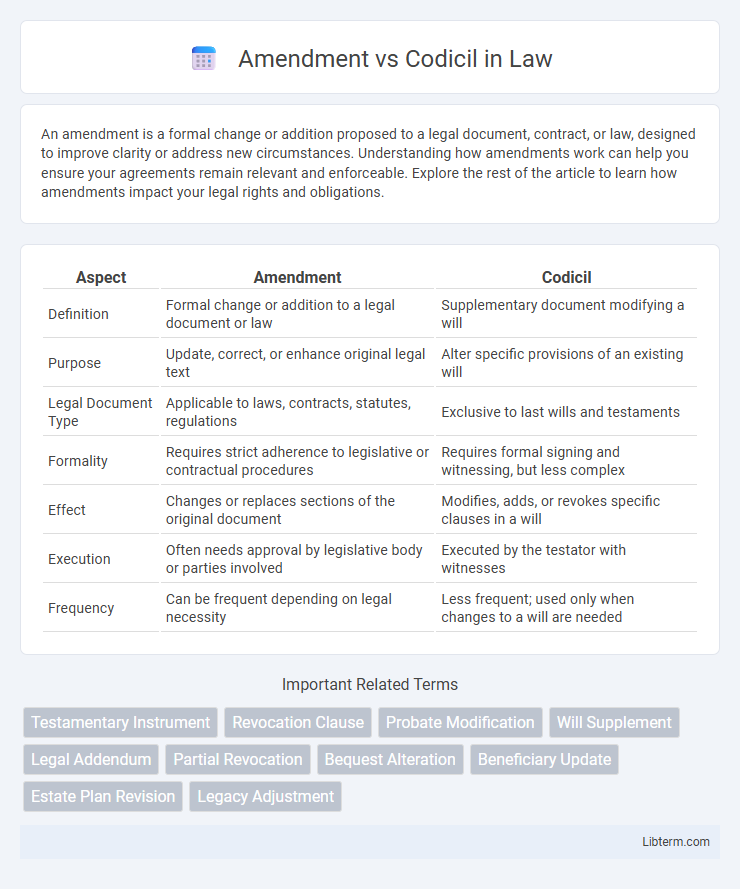An amendment is a formal change or addition proposed to a legal document, contract, or law, designed to improve clarity or address new circumstances. Understanding how amendments work can help you ensure your agreements remain relevant and enforceable. Explore the rest of the article to learn how amendments impact your legal rights and obligations.
Table of Comparison
| Aspect | Amendment | Codicil |
|---|---|---|
| Definition | Formal change or addition to a legal document or law | Supplementary document modifying a will |
| Purpose | Update, correct, or enhance original legal text | Alter specific provisions of an existing will |
| Legal Document Type | Applicable to laws, contracts, statutes, regulations | Exclusive to last wills and testaments |
| Formality | Requires strict adherence to legislative or contractual procedures | Requires formal signing and witnessing, but less complex |
| Effect | Changes or replaces sections of the original document | Modifies, adds, or revokes specific clauses in a will |
| Execution | Often needs approval by legislative body or parties involved | Executed by the testator with witnesses |
| Frequency | Can be frequent depending on legal necessity | Less frequent; used only when changes to a will are needed |
Introduction to Amendments and Codicils
An amendment is a formal change or addition made to a legal document, often used to update or clarify the original terms without replacing the entire document. A codicil specifically modifies a will, allowing testators to make minor adjustments without drafting a new will altogether. Both amendments and codicils provide flexible methods to ensure legal documents remain accurate and reflective of current intentions.
Definition of an Amendment
An amendment is a formal revision or change made to an existing legal document or contract, altering its original terms or provisions to reflect updated intentions or circumstances. It requires the same legal formalities as the original document, such as signatures or notarization, to be valid and enforceable. Unlike a codicil, which specifically modifies a will, an amendment can apply to a wide range of documents including contracts, laws, or bylaws.
Definition of a Codicil
A codicil is a legal document used to make minor changes or additions to an existing will without rewriting the entire document. It must be executed with the same formalities as the original will to be valid, including signatures and witnesses. Unlike an amendment, which commonly refers to changes in legal statutes or contracts, a codicil specifically modifies testamentary provisions.
Key Differences Between Amendments and Codicils
Amendments modify specific provisions within existing legal documents such as contracts or agreements, maintaining the original document's structure while updating terms or conditions. Codicils specifically pertain to wills, allowing the testator to add, remove, or alter parts without rewriting the entire will. Unlike amendments, codicils must be executed with the same formalities as the original will to ensure legal validity and clarity in testamentary intentions.
Legal Requirements for Amendments
Legal requirements for amendments demand precise documentation, often needing signatures from involved parties and witnesses to ensure validity. Amendments typically require compliance with original contract terms and statutory laws to prevent disputes and maintain enforceability. Courts scrutinize the clarity and intent of amendments, emphasizing the necessity for explicit language and proper execution procedures.
Legal Requirements for Codicils
Codicils must meet specific legal requirements including being signed by the testator and witnessed by the same formalities as a will to ensure validity. These documents serve to modify, add, or revoke provisions in an existing will without creating a new one. Failure to comply with legal standards may result in the codicil being declared invalid, causing unintended distribution of the estate.
Common Scenarios for Using Amendments
Amendments are commonly used to update contracts or legal documents, such as employment agreements or leases, to reflect changes in terms without rewriting the entire document. They provide a clear, legally binding method to modify specific clauses efficiently when parties negotiate new conditions or corrections. Unlike codicils, which specifically modify wills, amendments apply broadly across various legal contracts and agreements.
When to Use a Codicil Instead of an Amendment
A codicil is used to make minor changes or additions to an existing will without rewriting the entire document, whereas an amendment modifies the terms of a legal contract or document such as a trust or agreement. Choose a codicil when updating specific provisions in a will, like changing beneficiaries or executors, to simplify the process and avoid drafting a new will. Amendments are preferred for non-will documents requiring formal changes to detailed terms or conditions.
Potential Risks and Mistakes to Avoid
Understanding the distinction between an amendment and a codicil is crucial to prevent legal complications in estate planning. Amendments modify specific provisions within a will or trust, while codicils add or revoke entire sections; confusing these can lead to invalid documents or unintended distributions. Ensuring proper execution, including signing and witnessing requirements, helps avoid challenges or delays in probate proceedings.
Choosing the Right Approach: Amendment or Codicil
Choosing between an amendment and a codicil depends on the extent and complexity of changes needed in a legal document, such as a will. Amendments are suitable for minor revisions or updates within the same document, preserving the original structure while altering specific clauses. Codicils serve as formal additions to wills, enabling clear and legally recognized modifications without rewriting the entire document, making them ideal for substantial but isolated changes.
Amendment Infographic

 libterm.com
libterm.com